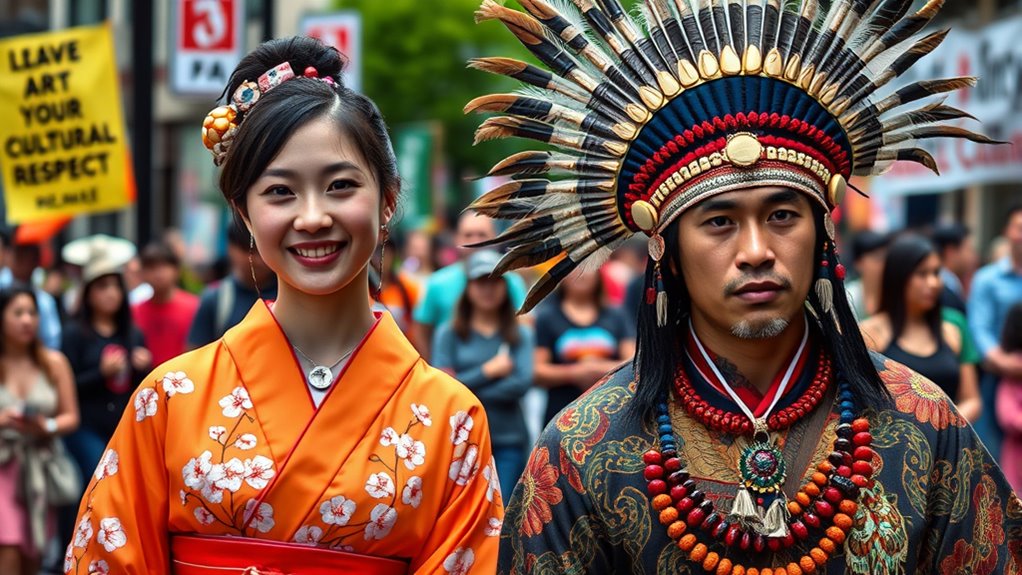When choosing a costume, it’s important to respect the cultural significance behind traditional attire. Cultural appropriation happens when you use elements of another culture without understanding or honoring their meaning, which can reinforce stereotypes and cause offense. To avoid this, learn about the origins and significance of the costumes you consider, and opt for respectful options that celebrate rather than stereotype. Staying aware of these issues helps you navigate the debate and celebrate diversity responsibly—continue to explore how to do so thoughtfully.
Key Takeaways
- Cultural appropriation occurs when cultural elements are used without understanding or respect, often leading to stereotypes or misrepresentation.
- Respectful costumes honor the meaning behind cultural attire and avoid trivializing or caricaturing traditions.
- Research and consultation with community members help ensure costume choices are culturally appropriate and appreciative.
- Costumes that perpetuate stereotypes reinforce harmful perceptions and diminish the cultural significance of traditional attire.
- Promoting cultural awareness and sensitivity fosters respectful celebration and prevents offensive or disrespectful costume choices.

Choosing a costume can be fun, but it’s also important to contemplate its cultural significance. When you pick an outfit, you’re not just selecting something festive; you’re potentially engaging with a culture’s identity and heritage. This is where the line between cultural appreciation and cultural appropriation becomes vital. If you want to avoid offending others, you need to think carefully about how your costume might be perceived. Respectful representation involves understanding the history and meaning behind certain attire, rather than simply using it as a costume for entertainment. It’s about honoring a culture’s traditions instead of reducing them to stereotypes or caricatures.
Choosing a costume thoughtfully respects cultural significance and promotes respectful celebration.
When you opt for a costume inspired by another culture, ask yourself if you’re genuinely appreciating the cultural elements or just appropriating them without context. For example, wearing Native American headdresses or traditional Asian garments without understanding their significance can come across as disrespectful. Instead, focus on celebrating cultures through respectful appreciation—perhaps by learning about their history, listening to stories from members of that community, or supporting artisans who create authentic items. Such actions show that you value the culture rather than trivializing it for a quick costume idea.
Being mindful of cultural boundaries isn’t always about avoiding certain costumes altogether but about approaching them thoughtfully. If you’re considering wearing a costume inspired by another culture, do your research. Understand its origins, meanings, and proper ways to wear or display it. Sometimes, this means choosing a different costume that pays homage without crossing into disrespectful territory. For instance, instead of dressing as a geisha, you could explore traditional Japanese arts or symbols that don’t carry the same risk of misrepresentation. This way, you’re engaging in a form of cultural appreciation that respects the original context.
It’s also worth considering how your costume might influence perceptions. Wearing something that perpetuates stereotypes can reinforce harmful ideas and hurt members of that community. Respectful representation involves being sensitive to these implications and choosing costumes that uplift rather than diminish. If you’re unsure whether your outfit might be offensive, it’s often better to select something more neutral or culturally respectful. Remember, celebrating diversity doesn’t mean appropriating it for a costume—it’s about honoring and understanding the richness behind different traditions. Additionally, understanding cultural significance can help you make more informed choices that promote respectful celebration.
Ultimately, your goal should be to enjoy festivities without causing offense or misrepresenting cultures. Thoughtful choices show that you value cultural diversity and are committed to respectful celebration. When you approach costume selection with awareness and care, you become part of a positive dialogue—one that fosters understanding, appreciation, and respect for all cultures.
Frequently Asked Questions
How Can I Choose a Costume That Respects Cultural Boundaries?
To choose a costume that respects cultural boundaries, you should prioritize cultural sensitivity and respectful representation. Research the culture you’re interested in, understanding its significance and context. Avoid stereotypes or overly simplistic depictions. Instead, opt for creative ideas that honor traditions without appropriating them. If unsure, ask someone from that culture or choose a different costume. This approach shows respect and helps foster understanding and appreciation.
What Are the Long-Term Impacts of Cultural Appropriation in Costumes?
Did you know over 60% of people feel cultural appropriation damages societal perceptions? When you wear costumes that dismiss cultural identity, it can lead to stereotypes and misunderstandings that persist long-term. This impacts how communities are viewed and how they see themselves. By respecting cultural boundaries, you help foster authentic appreciation, reducing misrepresentation and preserving societal perceptions that honor each group’s true identity.
Are There Guidelines for Culturally Respectful Costume Design?
When you design costumes, cultural sensitivity matters, and following clear costume guidelines helps you stay respectful. These guidelines often recommend avoiding stereotypes, researching the culture, and focusing on authentic representation. By doing so, you show respect for cultural significance and prevent misappropriation. Always prioritize understanding the history and meaning behind cultural symbols, and when in doubt, choose neutral or inspired designs instead of risking offense.
How Do Cultural Stereotypes Influence Costume Choices?
You should consider how cultural stereotypes influence costume choices because stereotypes often shape perceptions and reinforce misconceptions. When you rely on these stereotypes, your costume influence can perpetuate harmful ideas about a culture, leading to insensitivity or offense. To avoid this, think critically about the cultural significance behind costumes, and aim for respectful representation. Recognizing these influences helps you make thoughtful, culturally aware decisions in your costume selection.
What Role Do Cultural Communities Play in Costume Debates?
Think of cultural communities as guardians of their stories, much like elders passing down traditions. They shape costume debates by emphasizing the importance of respectful cultural representation and voicing concerns about misappropriation. When these communities speak up, they influence perceptions, urging others to contemplate authenticity over stereotypes. Your understanding deepens as you see how community voices help navigate the fine line between celebration and disrespect in costume choices.
Conclusion
As you step into the world of costumes, imagine the vibrant colors and rich patterns of cultures from around the globe. When you choose to wear a costume, think of it as a brushstroke on a cultural canvas—are you honoring or overshadowing? Respecting traditions adds depth to your celebration, turning a simple outfit into a meaningful expression. Let your costume be a bridge, not a barrier, fostering understanding amid the swirling tapestry of human diversity.









